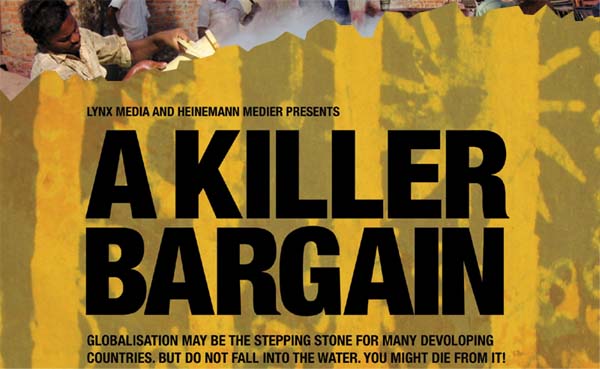
The world has never been smaller and the market has never been bigger.
This statement is both challenging and provocative.
When a traditional European company has more than 50 employees, you can be almost certain that the CEO´s are planning to outsource their production to a poor country in the third world – far away from the high salaries and expensive raw materials.
That’s globalisation – and that’s good. But can we trust the Western companies, when they promise the consumers that they have a high ethical, social, environmental and moral standard?What we saw and filmed during our 7.000 km long journey in India in the fall and winter of 2005 was like a nightmare. Farmers spraying their cotton fields with four to five times more than the recommended amount - completely unprotected and not even able to read the warning-sign on the pesticide containers from the multinational companies.
In the heavy fumes of the poisonous sprays, we found that many of the products manufactured and sold to the illiterate farmers have been banned in our part of the world for many years. We are quite aware of how dangerous the chemicals are but apparently we don’t give a damn about how the millions of Indian farmers are handling the toxic gasses - similar to the weapons of mass destruction that the UN-inspectors were so eagerly trying to find in Iraq.And what about the textile workers standing in acid baths up to their waists – supplying Western designer shops, discount outlets and supermarkets with the “beautiful textiles of India”– while their bodies are melting away in the toxic fumes of chlorine, acid and chemical dyes.
But the Dalit workers (formerly known as the untouchables) do not have an alternative. They migrate from some of the poorest states in India in the chase of survival on a dollar a day.Wherever we turned the camera, untreated chemical wastewater was being released directly into the rivers and canals. 100 metres further downstream, local farmers use the same water for irrigating rice, wheat and vegetables.Globalisation may be the stepping stone for many developing countries, but do not fall into the water.
You might die from it.
This statement is both challenging and provocative.
When a traditional European company has more than 50 employees, you can be almost certain that the CEO´s are planning to outsource their production to a poor country in the third world – far away from the high salaries and expensive raw materials.
That’s globalisation – and that’s good. But can we trust the Western companies, when they promise the consumers that they have a high ethical, social, environmental and moral standard?What we saw and filmed during our 7.000 km long journey in India in the fall and winter of 2005 was like a nightmare. Farmers spraying their cotton fields with four to five times more than the recommended amount - completely unprotected and not even able to read the warning-sign on the pesticide containers from the multinational companies.
In the heavy fumes of the poisonous sprays, we found that many of the products manufactured and sold to the illiterate farmers have been banned in our part of the world for many years. We are quite aware of how dangerous the chemicals are but apparently we don’t give a damn about how the millions of Indian farmers are handling the toxic gasses - similar to the weapons of mass destruction that the UN-inspectors were so eagerly trying to find in Iraq.And what about the textile workers standing in acid baths up to their waists – supplying Western designer shops, discount outlets and supermarkets with the “beautiful textiles of India”– while their bodies are melting away in the toxic fumes of chlorine, acid and chemical dyes.
But the Dalit workers (formerly known as the untouchables) do not have an alternative. They migrate from some of the poorest states in India in the chase of survival on a dollar a day.Wherever we turned the camera, untreated chemical wastewater was being released directly into the rivers and canals. 100 metres further downstream, local farmers use the same water for irrigating rice, wheat and vegetables.Globalisation may be the stepping stone for many developing countries, but do not fall into the water.
You might die from it.